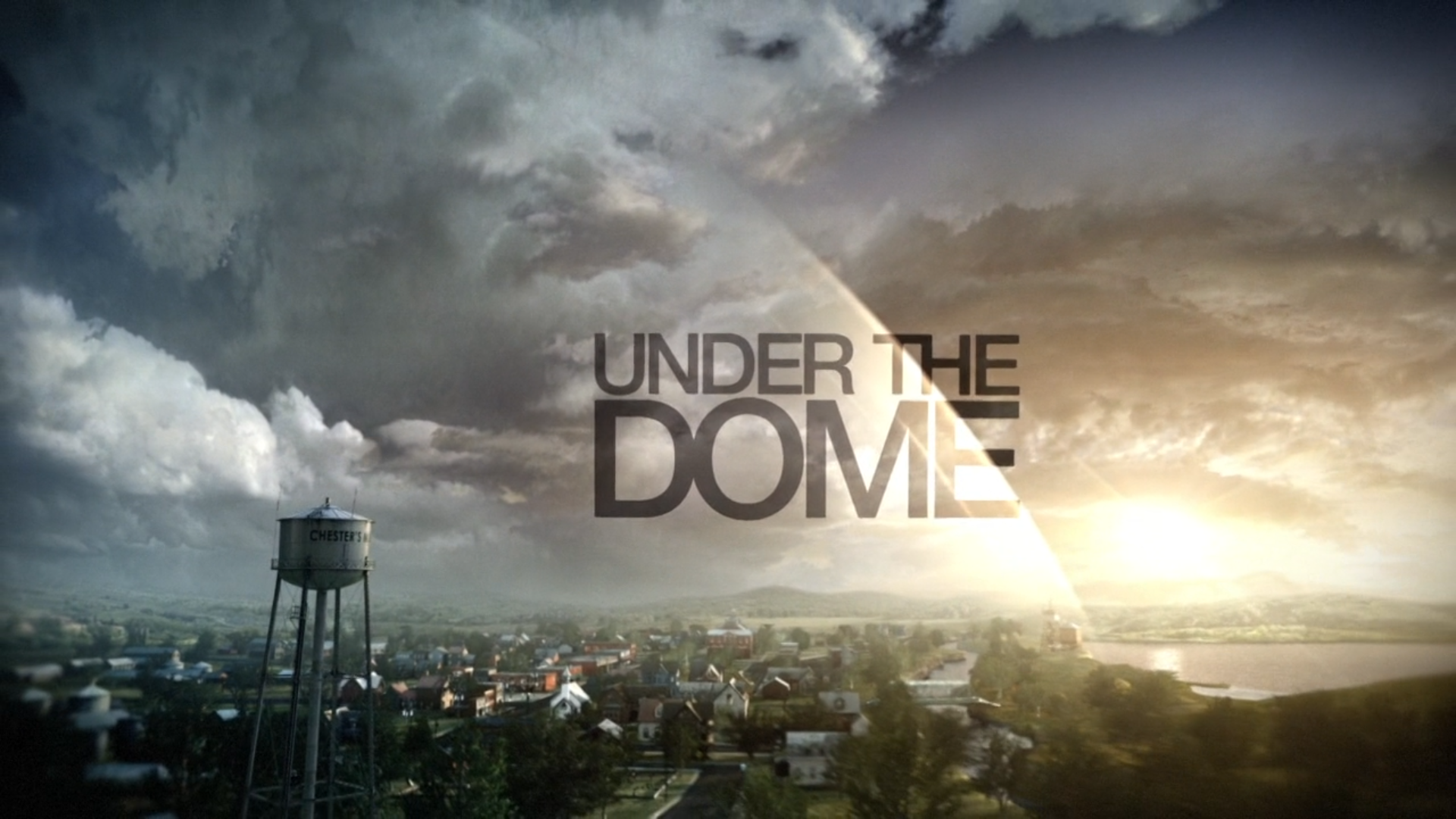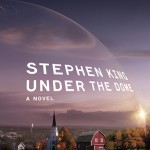written by David Steffen

Over the summer, CBS aired the first season of a TV series based on Stephen King’s novel Under the Dome (which I reviewed right here in 2010). To sum up, I thought the book overall was very good, as King’s strongest point is interactions between a large cast of characters, especially in the claustrophobic social environment of a small town.
Fair warning, I’m not going to make an effort to avoid spoilers here, because I can’t think of how to discuss the shows failings without verging into spoiler territory. To be fair, not a lot happened in the season that I would consider important enough to worry about a spoiler warning, but be aware of this. Quick summary version: Read the book instead and expect a decent read but a crappy ending.
First off, if you have read the book, the show will probably drive you completely nuts because they are not the same story. The extent of what they have in common: A mysterious and more-or-less impenetrable barrier inexplicably cuts the town of Chester’s Mill off from the rest of the world. Dale Barbara is a veteran. Julia Shumway is a reporter. Big Jim Rennie is the major political force, and is an asshole but likes to pretend he’s not one. That is the extent of the similarities. The characteristics of the dome are different. The nature of many of the characters are very different. Some characters who die immediately in the book are major characters in the show. The events are very different. The dome (apparently) does not even have remotely the same cause, though the season ended before revealing a great deal, but enough to make it clear that the ending in the book is not going to happen.
My opinion of the show might be somewhat tainted by the fact that I thought it was a miniseries, one which was preplanned, taped entirely in advance, and would run for a finite period and then stop. I thought that right up until the season finale when the story just ends. It’s not even a cliffhanger, but as if the writers said “oh crap I ran out of space, what do I do, what do I do, oh crap I’m going to get fired, oh crap. Oh I know! inexplicable ending–boom! Done!” This frustrated me to no end because the pace was so slow and the writing so bad that the only reason I’d watched the whole season (usually while doing Grinder maintenance or cross-stitching because the slowness was just ridiculous) was because I wanted to find out how they ended it in the TV series. It was a huge waste of time to watch the whole season. When the rest of it comes out I’m just going to get the Cliff’s Notes version of it.
The quality of the writing on the show is it’s biggest downfall. Some of the dialog is just so awkward it would be funny if it weren’t also a frustrating waste of time. I give credit to the actors who actually managed to pull off the lines as best they could pull off. Really, most of the casting was reasonably good, with the high point being Dean Norris as Big Jim Rennie–he pulls off the nasty small-town politician vibe with incredible effect.
The worst cases of the bad writing were all cases where someone confronts Big Jim Rennie about his behavior, suspicions of drug-dealing and murder, etc… He generally sticks to the explanation that he’s doing bad things for the good of the town, and this works shockingly often, even with the sheriff herself even after he has basically admitted to committing murder. The sheriff, played by Natalie Martinez, is about the only casting choice I think was questionable. Everything about her stance, expression, and voice lacks self-confidence, which is problematic for a policewoman, but more so for a sheriff. Granted, this is a relatively small town and she only becomes sheriff due to events in the show, but still I found her character very hard to take seriously, even more so when she bows to Big Jim Rennie’s more transparent bullshit. It just seemed like the writers wrote themselves into a highly tense corner that plausibly could only end with someone ending up dead, but then wrote themselves out of it by making a character implausibly gullible just long enough to move to the next scene.
I got the sense in many of the episodes that each one was written with a brief description of what came before and no idea what will come after, in isolation, by different writers, because it feels much too episodic either for a miniseries or for a series based around a major mysterious event. Often a new character is introduced, sometimes halfway through the season, and then is treated as if they’ve been a longstanding important character, sometimes dying shortly thereafter as if we’d been given enough time to care at all what has happened to them. There’s even an episode, a single episode, that centers around a fight club that gets started in the town to gamble with provisions–it is not mentioned before that episode and it is abolished by the end of the episode and it’s never mentioned again. What the hell? I mean, I’m a Chuck Palahniuk fan as much as the next guy, but that just came out of nowhere. The end result is that most episodes seem to kind of meander in their own direction, a direction which then changes completely for the next episode, having only the narrow main thread to follow from episode to episode.
And that main thread is weird, and completely unrelated to the book, all having to do with the origins of the dome which have a much more mystical, mythical, fantasy feel here with prophecies and inexplicable omens and messages from the dead than in the book where they were straight up science fiction. I don’t know if I dislike that element so much because it has nothing to do with the book, or just because I find the elements hokey in their own right. I don’t know. I kind of wanted to find out where they were going with these elements but only enough to watch to the end of what I thought was a miniseries. I wonder if other people who’d read the book were sticking around for the same reason–maybe the second season will tank and we’ll find out the answer without having to wait years. Then again, I get the impression that literally no one knows how it’s going to end, it’ll just be another Stephen King “pull it out of my ass” resolutions–like the book itself, but it’ll have to be different.
One of the greatest tragedies in the transition from book to show is the villainization of the character Dale “Barbie” Barbara. In the book he’s an ex-military vagrant taking short-order cook jobs and the like, who is just trying to leave town after he hurt someone in self-defense, but the dome blocks him before he can leave. In the show he’s ex-military, but he’s taken a job as a violent enforcer for a local gambling kingpin, and spends his days beating the tar out of gambling addicts who can’t pay up. In this case he’s actually killed one of these poor saps, who turns out to be the husband of Julia Shumway who he soon strikes up a romantic relationship with. And while he does some good things in the story, I never felt like he regretted anything bad he did, nor redeemed himself for it. In the TV show he’s little different than Big Jim Rennie, both of them are immoral assholes who get high on being seen as a hero but have no compunctions about killing whoever becomes inconvenient to further their goals. The late-season reveal that Mr. Shumway had been suicidal and provoked Barbie so that insurance wouldn’t balk at a suicide, seemed more of a cheap afterthought by the writers to redeem the character. I didn’t buy it–Mr. Shumway’s motivations are irrelevant to Barbie’s, so it doesn’t redeem anything. The core of the book was my empathy for Barbie, so when that’s taken away it’s very hard to care about anyone.
So, overall, the show has been a waste of time, though I’ll still look up a summary of how it ends. As I said in the intro: Read the book instead and expect a decent read but a crappy ending.

